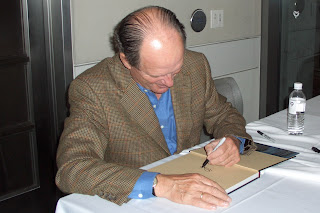According to the
Catholic Reporter, the Los Angeles archdiocese sponsored a Religious Education Conference in February 1998. One of the speakers was Bishop Kenneth Untener of Saginaw, MI, who “met with roaring applause . . . when a presenter described Untener’s decision to sell the bishop’s residence and live from parish to parish in his diocese.”
Bishop Untenor had sold the residence in 1980. From then on, he worked from his car and office, staying in parish rectories for weeks or months at a time. He did this for 24 years, the entire time he was Bishop of Saginaw, until he died in 2004.
Here's another story, from the Los Angeles Times.
Three nuns in a small convent in Santa Barbara, owned by the archdiocese of Los Angeles, are being evicted. They are 69, 55, and 49 years old. Their home is being sold to help pay for the $660 million pedophile priest settlement agreed to by the archdiocese of Los Angeles. At least $250 million of that must come from the archdiocese itself; insurance will pick up the rest.

The archdiocese, which five years ago completed the building of a $189.7 million cathedral on a downtown site that cost an additional $10.85 million, is selling off other properties. The 12-story administration building it occupies is for sale, for example. But it is the home of these nuns, who were in no way involved in crimes, lawsuits, or settlement, that has caught the public's attention.
Putting the elements together, I cannot help but wonder where Cardinal Roger Mahoney, who refers to himself as the "Chief Shepherd of the Archdiocese of Los Angeles," lives.
I don't want his home address, of course (I'm sure that secret is as sacred as the confession of a . . . no, never mind.)
But I do wonder if the Cardinal is setting the example for the nuns and others who must give up their homes to pay for the crimes of others. Is he downscaling? Has he considered doing as Bishop Untener did?
Such a gesture might go a long way to restoring credibility and respect to his office.
 The Los Angeles Times (I think it was them) reports that Jon Stewart and Stephen Colbert have arranged with Comedy Central to keep paying non-writing (and therefore non-striking) staff members, at least through this week. Variety reports that Jay Leno has assured his staff he will pay them through the holidays. Apparently, Letterman, Conan O’Brien, and Jimmy Kimmel have also stepped up to the plate.
The Los Angeles Times (I think it was them) reports that Jon Stewart and Stephen Colbert have arranged with Comedy Central to keep paying non-writing (and therefore non-striking) staff members, at least through this week. Variety reports that Jay Leno has assured his staff he will pay them through the holidays. Apparently, Letterman, Conan O’Brien, and Jimmy Kimmel have also stepped up to the plate.


 This 1997 pictures shows NAGPRA in action. The box contains the rattle of a Sioux medicine man, Elk Head. The rattle is being returned to a descendent of Elk Head by the South Dakota State Historical Society Museum.
This 1997 pictures shows NAGPRA in action. The box contains the rattle of a Sioux medicine man, Elk Head. The rattle is being returned to a descendent of Elk Head by the South Dakota State Historical Society Museum.


 This picture , credited to DigitalGlobe, is of the Great Aten temple at Tell al-Amarna. It shows a temple enclosure wall in the north, buried under a modern cemetery.
This picture , credited to DigitalGlobe, is of the Great Aten temple at Tell al-Amarna. It shows a temple enclosure wall in the north, buried under a modern cemetery.


































